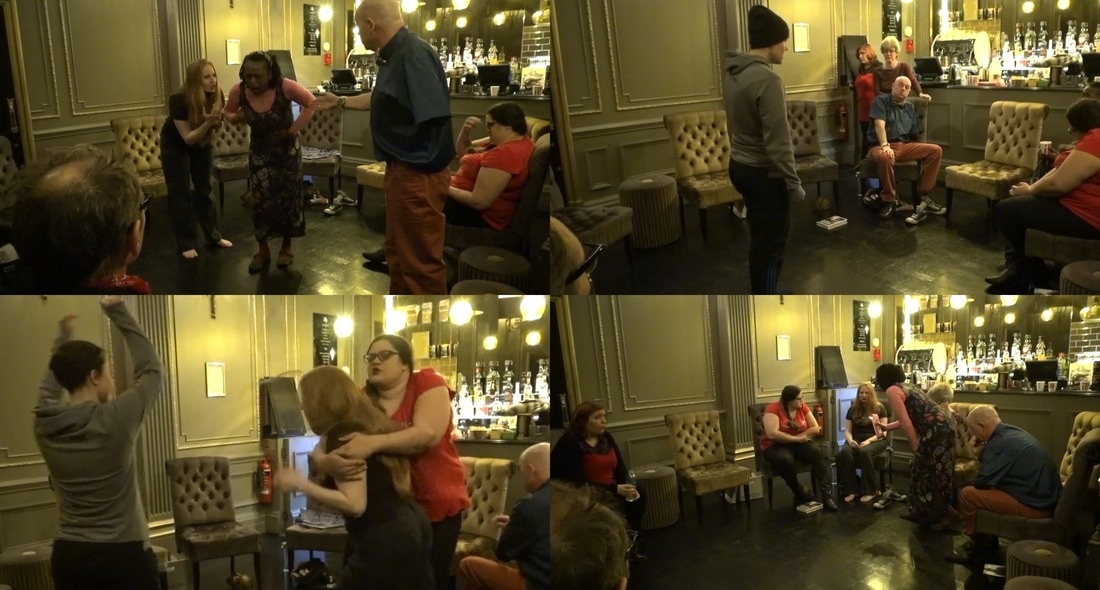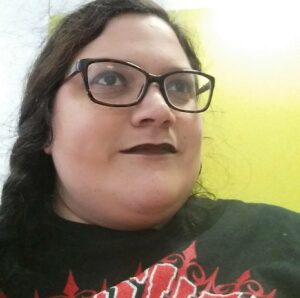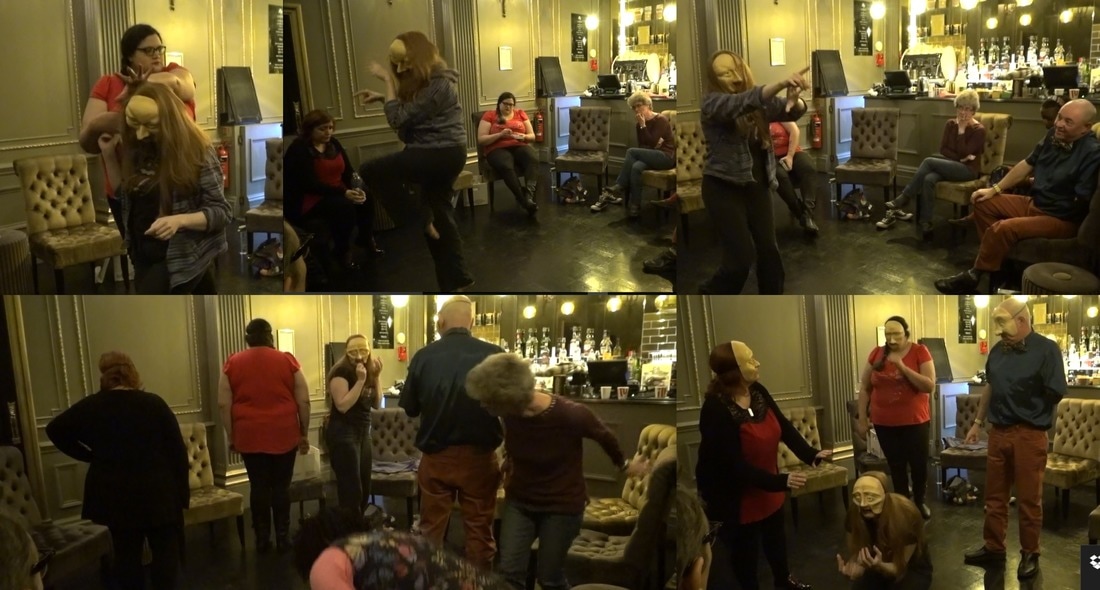
Part 2 MARK STATMAN: MEXICO AND THE POETRY OF GRIEF AND CELEBRATION
Part 2 of my interview with Mark Statman looks closely at Mark’s Latin American poetic influences, his life in Mexico and ends with an extract


I interviewed Lyanne Thornton-Harewood of May Contain Nuts, a theatre company who deal mainly with mental health issues, challenging the stigma that surrounds the subject.
Leslie: Firstly, I’d like to ask you about how you became involved in May Contain Nuts – your personal route, how the company has developed, its purpose and repertoire.
Lyanne: My personal journey in May Contain Nuts started with drama therapy. Initially I was sceptical of drama therapy doing anything for me, I just couldn’t figure out how it could possibly help me sort through this thick goop of memories and emotions and toxic thoughts that were all running around my brain at high speed. If I couldn’t catch a thread of anything to be able to talk about in therapy, what could drama therapy do? Still I turned up every week and slowly things started to click. It helped that I was also seeing a psychotherapist weekly, but I found getting up and doing something interactive also helped, in that it was as fluid as everything that was going on in my brain. A session would start with a check in to see how everyone was and what kind of things they were dealing with that particular week, day or moment. That’s when the magic would happen. Our facilitator Gerald Maiello would take in everything everyone said or didn’t say and he would pull these common threads out and create a scenario for us to act out. There was never any pressure to get up and take parts, but the spirit of this is to help us get a better sense of what’s going on with ourselves there would always be volunteers.
About a year into the therapy Gerald mentioned that he was thinking about setting up a drama group that wouldn’t be therapy, it would be about exploring whatever we wanted. At that point none of us were even thinking about performing, we just saw it as another day we could get out of the house for a few hours to spend more time with people who understood the struggles we felt. It was about just being in one place together – whether in conversation, or sat in comfortable silence knowing that we weren’t quite as alone as our illnesses were trying to make us feel we were.
The first thing we did as a company was change the name. Gerald had been advertising the group in the little lounge area as ‘The Rude Mechanicals’ from A Midsummer Night’s Dream. We settled on May Contain Nuts, and our first piece started as a man in a chair on stage.

We meet every Tuesday from 1.00pm till 3.00pm. From that we can get anywhere from two to twenty minutes of material depending on what we are working on and how long the finished product will be. Our first piece eventually moved from being a man in a chair to ‘Insidious Baggage’. Around the autumn of 2012 Gerald had mentioned that he did a drama workshop at the University of Hertfordshire for the second year Doctorate in Clinical Psychology students and would be interested in performing ‘Insidious Baggage’ for them, and maybe helping out with the workshop after the performance. We agreed to do it and all too soon it was time to perform outside of our safe confines of the Shrodell’s unit in Watford General Hospital. The date was 21st December 2012, which also coincided with the Mayan calendar ending, so we all thought that if we bombed our performance at least the world would be ending. We even worked some jokes into the play about the world ending.
After we had performed and had taken our bows we all looked at each other and thought, this is good. We even managed to split off into small groups with the students to talk about the piece and our experiences of being in mental health services and in day-to-day life. It was around this time that we decided that we would like to go as far as we could with May Contain Nuts, reaching people from all walks of life to shed more light on mental health and end the stigma that surrounds it. For me, it was great to perform a thought-provoking piece of work and to talk to people who weren’t beaten down by the targets-and-performance led NHS. Skipping forward to now we have 3 long plays in our box of tricks, ‘Insidious Baggage’, ‘Butterflies and Lambs’ (which was partly inspired by getting stuck in a lift at that first performance). We also have ‘Little Cuts’ which is a play about self-harm aimed at year 10 upwards in secondary schools. We’ve also started branching out into smaller pieces that don’t always have anything to do with mental health, such as the Old Town Ghost Walks in Hemel Hempstead and working with Mark Crane, developing the Sci-Fi piece Blue Pixie for the open mic style night at The LP Café, Watford.
Leslie: Would you like to expand on the group aim of ‘Working to end the stigma around mental ill health, to educate and to illuminate the darker paths some of us tread’?
Lyanne: Through our workshops and after our scratch performances we get the opportunity to sit and chat with our audiences about the piece they’ve just seen and about our own personal experiences. I have a few examples I use when talking about things that have been said to me, ranging from family members to psychiatrists. My first psychiatrist once told me that if I think good thoughts it will reflect on my behaviour. The receptionist from the Shrodell’s unit also told me very early on in my therapy journey, that I didn’t ‘look’ like I had mental health problems. This remark struck me as very odd because the people attending the unit differed widely in terms of age, ethnic background, religion and class. In any case, judged purely by ‘looks’, some always managed to be washed and dressed in clean clothes while some struggled to carry out basic hygiene practises.

My concern about psychiatrists is that the NHS is overstretched these days and their pay can be so dependent on results that it sometimes makes me just want to give up and hide away in my room forever – which is why I don’t! Before and after rehearsals, myself and other Nuts members will sit and chat, and at least twice a month things will turn to jarring things said or done by people we see in therapeutic settings. One member had recently been told by her social worker that people might think that, with her manic and depressive episodes, she’s playing games with them.
In terms of educating, our research threw up some shocking statistics. For instance, one in ten of 11-15 year-olds may be experiencing mental health problems at any time, i.e. three in every class. But perhaps the best example is the feedback we had from performing ‘Little Cuts’. In the play we talked about the first things that spring to mind when someone mentions self-harm i.e. cutting , burning or breaking bones, but we also touched upon things like smoking, alcohol consumption, even staying in toxic relationships when you know they’re bad for you. A member of staff admitted that she never thought of smoking or drinking as being self-harm, but as one of the characters in the piece says, just because you can’t see the scars on your liver doesn’t mean they’re not there.
Leslie: May Contain Nuts Theatre also describe your collective work as ‘saving ourselves’ – can you describe how members of the company have gained from the experience?
Lyanne: Being in May Contain Nuts brings me together with people who know exactly what I’m going through during a week, day, hour, minute or even a second. It’s that quick for me. I might be fine for ages then all of a sudden something happens and I either become manic or depressed. Sometimes I can pinpoint what has pushed me in either direction, sometimes it can take weeks to figure out what led to how I’m feeling. When I’m with the Nuts, I never feel like I need to hide how I’m feeling, it’s one of the few places where I feel completely safe to be myself without being judged, which is something I know is echoed among the other members of Nuts. The thought of Tuesday being Nuts time can also sometimes be the only thing that gets us through a week!
Leslie: You create ‘original theatre through improvisation’. Can I ask you to describe a typical improv show of yours. Who are the improv groups you admire? What are the ‘unwritten rules’ of improv and how do you rehearse?
Lyanne: A typical performance starts with Gerald introducing the piece and explaining a little about how we decided on the themes and how we approached making the piece. We then perform, Gerald puts in another little speech at the end, then dependent on where we are performing there is either a break for lunch or tea then a split into smaller group work, or we get straight into chatting with the audience after which the session ends. A couple of companies that we always mention are Complicité and We Can’t Believe We’re Not Better, which is another group that Gerald helped set up. We also use a lot of Brechtian techniques in our work to make the audience think and Antonin Artaud/Theatre of Cruelty techniques to keep the audience off balance – because they show how we experience the world. I have to say that personally I don’t think there are many unwritten rules of improv theatre, but the one essential thing is knowing what the key points are to keep the story moving along. Each rehearsal and performance is different, I don’t think we have ever had two performances that have been exactly the same as we are constantly forgetting some lines, or putting in things that we’ve read since the last performance, or happen during the performance. One example is that during a live performance of ‘Little Cuts’, someone tried to enter the room and Katie, the dominant character in the play, called over her shoulder that this was a closed rehearsal and carried on as if the audience weren’t there.
To come up with new pieces, we have a general chat about what themes we want to explore, then we get up and start moving around and seeing what interactions come out. At some point we also hot-seat our characters so we know what their thoughts and feelings are. Even if the characters aren’t major characters sometimes their intentions and beliefs can be the thing that helps propel our piece towards an end. To get usable material we repeat what we have done over and over till we get to a point where it flows naturally and we feel comfortable moving on to the next part of the play. But nothing that we’ve rehearsed is ever set in stone. Sometimes things can be cut out or new ideas introduced on the day of a performance, even only a few minutes before a performance has started! But most of the time rehearsing that late happens because the layout is different from where we’ve been rehearsing, so we need to block out entrances and exits and where to stand.

Leslie: You: ‘Bring performances and workshops with a focus on mental health into schools and universities.’ Can you tell us about the ups and downs of this experience, please?
Lyanne: I think the worst audience we have ever had was the psychiatrists in the Shrodell’s unit very early on in 2013. We were performing ‘Little Cuts’ after they had had a lunchtime meeting with a pharmaceutical company, so we had lots of people eating loudly. At one point we had someone’s pager go off for a meeting and when they were half way out they doubled back, loudly reminding a colleague that they needed to be in the meeting as well. We came away with an overall feeling that they weren’t really engaged with what we were doing.
Another thing we can struggle with is when some students decide they don’t want to engage at all with what we are doing. Luckily this happens rarely, and we’ve always had very good feedback from our workshops at the University of Hertfordshire.
For me, our best audience are the Drama Therapy students from Roehampton University. It’s a bit daunting as we workshop with all three years of Drama Therapy students, but they’re always engaged and ready to get up and do their own improv pieces based on what we have shown them – even the lecturers get involved!
We first performed ‘Little Cuts’ at Sir John Lawes secondary school. We were a little worried that we wouldn’t engage the students all of whom were years 10 and 11, on a Friday afternoon, which we had been told by the teachers was the dead zone for trying to teach. But we had a very good session where they split off into groups to discuss the different characters in the play, and one group even got up and did some improv of their own about one of the characters!
May Contain Nuts will perform their new play about mental health issues at Berkhamsted Live 16 on March 14th. You can book tickets here.
Next week in LEARNING FOR ALL, I interview Anne Page about family learning, the Apuldrum Centre, and inclusive provision in the UK.
ABOUT LESLIE TATE’S BOOKS:

Part 2 of my interview with Mark Statman looks closely at Mark’s Latin American poetic influences, his life in Mexico and ends with an extract

I interviewed international poet and translator Mark Statman about Volverse/Volver, his 14th published collection. Mark, who has won national arts awards, is Emeritus Professor of Literary

I interviewed Lisa Dart, finalist in the Grolier, Aesthetica and Troubadour Poetry Prizes and author of The Linguistics of Light (poems, Salt, 2008), Fathom (prose

I interviewed writer Julia Lee Barclay-Morton about her experience of autism. Julia began as an experimental dramatist in New York, moving to the UK to

I interviewed Gillean McDougall from Glasgow, who edited the collaborative projects Honest Error (on Charles Rennie Mackintosh and his wife Margaret Macdonald) and Writing the
| Cookie | Duration | Description |
|---|---|---|
| cookielawinfo-checkbox-analytics | 11 months | This cookie is set by GDPR Cookie Consent plugin. The cookie is used to store the user consent for the cookies in the category "Analytics". |
| cookielawinfo-checkbox-functional | 11 months | The cookie is set by GDPR cookie consent to record the user consent for the cookies in the category "Functional". |
| cookielawinfo-checkbox-necessary | 11 months | This cookie is set by GDPR Cookie Consent plugin. The cookies is used to store the user consent for the cookies in the category "Necessary". |
| cookielawinfo-checkbox-others | 11 months | This cookie is set by GDPR Cookie Consent plugin. The cookie is used to store the user consent for the cookies in the category "Other. |
| cookielawinfo-checkbox-performance | 11 months | This cookie is set by GDPR Cookie Consent plugin. The cookie is used to store the user consent for the cookies in the category "Performance". |
| viewed_cookie_policy | 11 months | The cookie is set by the GDPR Cookie Consent plugin and is used to store whether or not user has consented to the use of cookies. It does not store any personal data. |
4 responses
Hi Lynne,
I too, was lucky enough to be interviewed by Leslie. What you’re doing here is fabulous. Bring it on! Have sent you my personal message via Facebook.
Jo Hampshire UK
http://www.jo-b-creative.blogspot.co.uk
🙂 🙂 🙂
There are so many amazing things available in the UK, Leslie. This sounds wonderful.
🙂 🙂 🙂